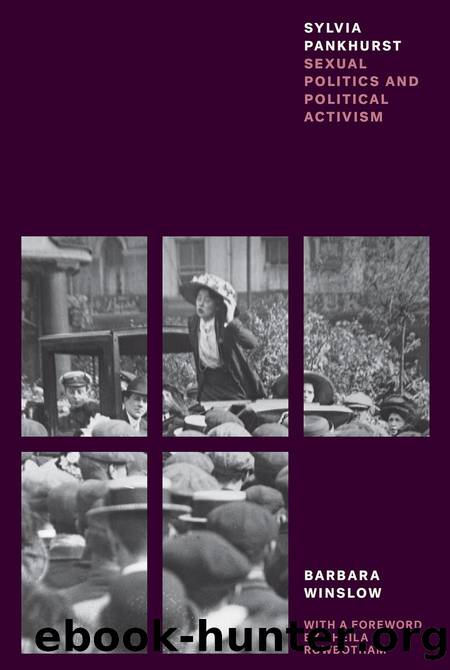Sylvia Pankhurst by Barbara Winslow

Author:Barbara Winslow
Language: eng
Format: epub
Publisher: Verso Books
Chapter Six
International communism
In the period 1917â24, revolutionaries throughout the world were attempting to organize communist parties in their own countries as well as strengthening and building the Third or Communist International (CI) based in Moscow. Sylvia Pankhurst was at the centre of this revolutionary activity as her politics continued their leftward transformation into what Lenin labelled in 1920 as âultra-leftâ. Ironically, Pankhurst had come such a long way since her work for womenâs suffrage that she now believed in abstentionism â that on principle revolutionaries should never participate in bourgeois parliamentary activities such as voting or running for Parliament. She also argued that revolutionaries should not affiliate with reformist organizations such as the British Labour Party or the official trade union organizations. Initially, she attempted to argue these positions as a left-wing opposition within the Communist International.
However, although Pankhurst was in the centre of activities surrounding the formation of the British Communist Party, she was not able to influence or to lead it and she was expelled in 1921. This meant she was not only politically separated from the British Communist Party and the Communist International but also viewed by communists as a political pariah. Although she could now argue her positions more âfreelyâ, she recognized the difficulties of operating as an unaffiliated left-wing individual oppositionist in a hostile socialist milieu and amid a declining working-class movement.
Between 1918 and 1921, the Dreadnoughtâs wide coverage of international events set it apart from other newspapers. In July 1917, when the paperâs name was changed to the Workersâ Dreadnought, the subtitle became âSocialism, Internationalism and Votes for Allâ.1 No less impressive were Pankhurstâs own widespread international contacts. She was in close touch with leading revolutionaries in Russia (Alexandra Kollontai), Germany (Clara Zetkin), Holland (Herman Gorter, Anton Pannekoek, Henrietta Roland Holst), Italy (Antonio Gramsci and Amadeo Bordiga) and even Hungary (Bela Kun). When Maxim Litvinov and Theodore Rothstein (representatives of the Third International) came to Britain, they sought her out as an important and influential revolutionary.
Also indicative of Pankhurstâs importance was the extent to which her articles appeared in leading foreign socialist journals. In early 1918, she was slipping material past the censor to Avanti, the journal of the Italian Socialist Party. These articles concerned the secret wartime treaties between czarist Russia and the other Allies, outlining the proposed carve-up of Europe and the Middle East following the successful conclusion of the war. Throughout 1919, Pankhurst was the British correspondent for the Communist International, the official journal of the Comintern executive. Four articles of hers appeared between June and September, although the last one â her celebrated letter to Lenin on the question of participation in parliamentary elections â was printed anonymously. The first article was about the war of intervention. She appealed to British workers and soldiers to oppose intervention and to abandon any illusions that Labour MPs would take a strong anti-intervention stance. For in Parliament, she wrote, âcourage seems to evaporate like a childâs soap bubbleâ.2 The article accused all nations
Download
This site does not store any files on its server. We only index and link to content provided by other sites. Please contact the content providers to delete copyright contents if any and email us, we'll remove relevant links or contents immediately.
I Have Something to Say by John Bowe(3286)
What Happened to You? by Oprah Winfrey(1476)
Doesn't Hurt to Ask by Trey Gowdy(1402)
Einstein: His Life and Universe by Walter Isaacson(1319)
Solutions and Other Problems by Allie Brosh(1033)
Disloyal: A Memoir by Michael Cohen(1024)
American Dreams by Unknown(860)
Don't Call it a Cult by Sarah Berman(842)
Infinite Circle by Bernie Glassman(831)
Home for the Soul by Sara Bird(813)
Group by Christie Tate(811)
Talk of the Ton by unknow(736)
The Silent Cry by Cathy Glass(684)
Total F*cking Godhead by Corbin Reiff(666)
Severed by John Gilmore(656)
Searching for Family and Traditions at the French Table by Carole Bumpus(650)
The Battle of Mogadishu by Matt Eversmann & Dan Schilling(615)
Before & Laughter by Jimmy Carr(607)
Things I Wish I Knew Before My Mom Died by Ty Alexander(601)
